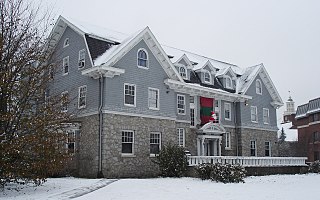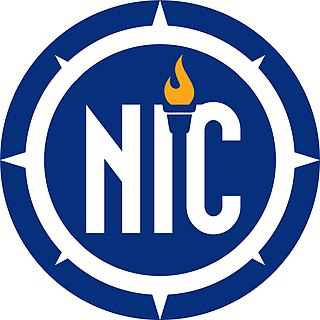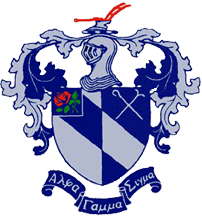
North American fraternity and sorority housing refers largely to the houses or housing areas in which fraternity and sorority members live and work together. In addition to serving as housing, fraternity and sorority housing may also serve to host social gatherings, meetings, and functions that benefit the community.

The North American Interfraternity Conference is an association of intercollegiate men's social fraternities that was formally organized in 1910. However, it began at a meeting at the University Club of New York on November 27, 1909. The power of the organization rests in a House of Delegates in which each member fraternity is represented by a single delegate. However, the group's executive and administrative powers are vested in an elected board of directors consisting of nine volunteers from various NIC fraternities. Headquartered in Indianapolis, Indiana, the NIC has a small professional staff.
Dartmouth College is host to many fraternities and sororities, and a significant percentage of the undergraduate student body is active in Greek life. In the fall of 2022, 35 percent of male students belong to a fraternity and 36 percent of students belong to a sorority. Greek organizations at Dartmouth provide both social and residential opportunities for students and are the only single-sex residential option on campus. Greek organizations at Dartmouth do not provide dining options, as regular meal service has been banned in Greek houses since 1909.

Sigma Alpha Epsilon (ΣΑΕ) is a North American Greek-letter social college fraternity. It was founded at the University of Alabama in Tuscaloosa, Alabama, on March 9, 1856. Of all existing national social fraternities, Sigma Alpha Epsilon is the only one founded in the Antebellum South. Its national headquarters, the Levere Memorial Temple, was established on the campus of Northwestern University in Evanston, Illinois, in 1926. The fraternity's mission statement is "To promote the highest standards of friendship, scholarship and service for our members throughout life."

Sigma Theta Epsilon (ΣΘΕ) was an American interdenominational national Christian fraternal organization that operated from 1925 to 2022. It had 47 chapters across the United States.

Alpha Gamma Sigma is a national collegiate social and professional agricultural fraternity in the United States.

Sigma Alpha Epsilon Pi (ΣΑΕΠ) is a national Jewish sorority. It was founded on October 1, 1998, at the University of California, Davis.

Sigma Phi Epsilon (ΣΦΕ), commonly known as SigEp, is a social college fraternity for male college students in the United States. It was founded on November 1, 1901, at Richmond College, which is now the University of Richmond, and its national headquarters remains in Richmond, Virginia. It was founded on three principles: Virtue, Diligence, and Brotherly Love. Sigma Phi Epsilon is one of the largest social fraternities in the United States in terms of current undergraduate membership.

Tau Kappa Epsilon (ΤΚΕ), commonly known as ΤΚΕ or Teke, is a social college fraternity founded on January 10, 1899, at Illinois Wesleyan University. The organization has chapters throughout the United States and Canada, making the Fraternity an international organization. Since its founding in 1899, Tau Kappa Epsilon Fraternity has never had an exclusionary or discriminatory clause to prevent individuals from joining and has instead admitted members based on their "personal worth and character". As of spring 2024, there are 209 active ΤΚΕ chapters and colonies with over 301,000-lifetime members.

Sigma Alpha Epsilon Chapter House of Miami University is an historic building in Oxford, Ohio. It was listed in the National Register on February 8, 2005.

Sigma Mu Sigma (ΣΜΣ) is a former American college fraternity founded in 1921 at Tri-State University. Sigma Mu Sigma was historically an all-male social fraternity open originally to Master Masons, and later open to all undergraduate male students. As a national fraternity, Sigma Mu Sigma dissolved in 1935 when it was absorbed by Tau Kappa Epsilon. Sigma Mu Sigma was later revived, developed another dozen chapters, and several of these were absorbed by Kappa Sig, Acacia and others. A few remaining chapters of Sigma Mu Sigma transformed into a co-ed service fraternity in 1984 but went defunct around 2020.
The list of University of Minnesota fraternities and sororities is extensive. Approximately 11% of undergraduates, 3,400 students, participate in one of the sixty chapters of social fraternities or sororities at the University of Minnesota, Twin Cities campus. Participation in affiliated groups associated with the Greek System such as honor, service, and professional fraternities bring total Greek System affiliation figures significantly higher. Counting past and present, more than half of the university's 200 Greek organizations remain active today, the pioneers of which have had a presence on the University of Minnesota campus for over 145 years. The university's Greek System includes professional fraternities, honor societies, service fraternities, and religious fraternities along with the highly visible residential undergrad academic and social chapters.
The University of Oklahoma Sigma Alpha Epsilon racist incident, known as SAE-OU racist chant incident, occurred on March 7, 2015, when members of the University of Oklahoma (OU) chapter of Sigma Alpha Epsilon (SAE) were filmed performing a racist song that used the word "nigger" and referenced Jim Crow.

Fraternities and sororities at the University of Virginia include the collegiate organizations on the grounds of the University of Virginia in Charlottesville, Virginia. First founded in the 1850s with the establishment of several fraternities, the system has since expanded to include sororities, professional organizations, service fraternities, honor fraternities, and cultural organizations. Fraternities and sororities have been significant to the history of the University of Virginia, including the founding of two national fraternities Kappa Sigma (ΚΣ) and Pi Kappa Alpha (ΠΚΑ).

The Delta Kappa Epsilon Fraternity House was a historic fraternity house located at the University of Illinois at Urbana–Champaign in Champaign, Illinois. It was built in 1906 and was used by various fraternities and sororities before being demolished in 2020.

The Sigma Alpha Epsilon Building is a historic Sigma Alpha Epsilon fraternity house located near the University of Missouri at Columbia, Missouri. It was added to the National Register of Historic Places in 2014.

The Sigma Alpha Epsilon Fraternity House is a historic fraternity house in Moscow, Idaho. It was built in 1932 for the Idaho Alpha chapter of Sigma Alpha Epsilon at the University of Idaho. The house was designed by architect Charles I. Carpenter in the Colonial Revival style. It has been listed on the National Register of Historic Places since December 31, 1993.

















